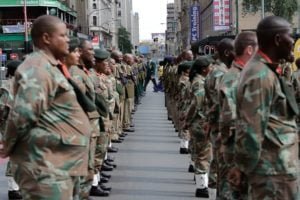As the sun rises on March 17, South Africa awakens to a new day and echoes its ever-evolving history. But what specific tales does this particular date whisper? We embark on a journey to uncover the threads woven into the fabric of March 17 in South Africa.

1999: Allan Boesak guilty on charges of fraud
Allan Boesak, a South African politician and activist was found guilty of fraud for embezzling about R1.3 million from the Foundation for Peace and Justice. He had been accused of diverting the money donated by Danchurch Aid, Coca Cola Foundation, and Paul Simon, meant for development projects in the Western Cape. Boesak was jailed in 2000, but released in 2001 after serving over one year of his three-year sentence. He was readmitted as a church minister in 2005 after his criminal record was cleared by South African President Thabo Mbeki.
1992: President F.W. de Klerk announces Whites-only referendum results
In 1992, a whites-only referendum was held in South Africa to determine support for the reform process started by President F.W. de Klerk. The majority of Afrikaans-speaking whites approved of the negotiations, with 62% in favour compared to 79% of English-speaking South Africans. The result of 68.6% in favour was hailed worldwide as the end of apartheid in South Africa.
1982: Steven Pienaar is born in Johannesburg
Steven Pienaar is a South African footballer who played for Ajax Cape Town before moving to European teams like Borussia Dortmund and Tottenham Hotspur. He made his international debut with Bafana Bafana in 2002 and retired from the international arena in 2012. He currently plays for Sunderland FC.
1965: Andrew Charles Hudson is born
Andrew Charles Hudson is a former South African cricketer who played in 35 tests and 89 One Day International cricket matches in the 1990s. He was known for his calm demeanour under pressure and for being the only South African batsman to score a century on his opening debut until 2003. Hudson retired in 2001 and now works as a financial consultant.
1950: Suppression of Communism Act 44 of 1950 severely limits what the media could report
The Suppression of Communism Act 44 of 1950 was a notorious security law during the apartheid era. It banned threats and silenced individuals and organizations, including the Communist Party of South Africa (CPSA). The CPSA voluntarily disbanded in 1950 to protect their assets from state confiscation and retain their seats in the Assembly and Cape Provincial Council. However, in response, the government amended the act in 1951 to target people who had been communists in the past. This led to the expulsion of Sam Kahn and Fred Carneson from their respective government positions in 1952.
1904: German action in Herero Revolt is condemned in the Reichstag
The Ovaherero people were a cattle-based society living in Namibia, Botswana and Angola. In 1904, they rose against German colonial rule in Namibia, demanding grazing for their livestock. August Bebel of the German Social Democratic Party condemned the “suppression war” against the Ovaherero and called their resistance a “justified liberation war”.
1890: Actress and teacher Wilhelmina Freund is born
Minna Freund was an actress and elocution teacher born in Germany to South African German immigrants. She became the first qualified teacher of elocution in South Africa and taught at several schools, including the South African College of Music, Good Hope Seminary, St Cyprian’s School, Wynberg Girls’ High School, and Ellersley School for Girls. In 1912, she was appointed head of the Department of Speech Training at the South African College of Music by Prof. W.H. Bell.
1820: The first 1820 British Settlers arrive in South Africa
After the Napoleonic wars, Britain had an unemployment problem. In 1820, the British government encouraged immigration to the Cape colony. Approximately 4,000 settlers arrived in the Cape, in around 60 different parties, between April and June 1820. Most settled in the frontier area of what is now the Eastern Cape. The settlers were granted farms, but many left due to harsh living conditions. Some settlers remained as farmers and made a significant contribution to agriculture. Others contributed to business and the economy, leading to the growth of new towns such as Port Elizabeth and Grahamstown. Another group of settlers continued on to Natal, where they were granted permission to stay by King Shaka in return for firearms. The 1820 settlers are commemorated in Grahamstown by the 1820 Settlers National Monument.



